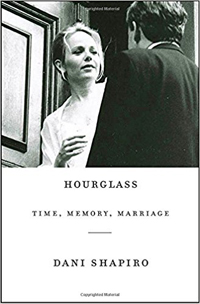 Dani Shapiro, Hourglass: Time, Memory, Marriage (New York: Knopf, 2017), 145pp.
Dani Shapiro, Hourglass: Time, Memory, Marriage (New York: Knopf, 2017), 145pp.
Toward the end of Dani Shapiro's poignant reflections about twenty years of marriage, she recalls a conversation with her aunt who told her that she "once had a terribly difficult period that lasted twenty-four years. And it was so important to realize that I didn't know what was on the other side of the darkness. Every so often there was a sliver of light that shot the whole world through with mystery and wonder, and reminded me: 'I didn't have all the information.'"
Perhaps twenty-four years of stoicism is setting the bar of expectations quite low, but nonetheless, most people in most marriages who have been paying attention will acknowledge "the velocity of time, the accretion of sorrow. The things that cannot be fixed." Between the ages of fifty and eighty, observed Grace Paley, the years fly by like seconds. Family vacations. Teenagerdom. Marriage therapy. Deaths and near-deaths. Alzheimers and car accidents. Deferred maintenance on the house that's now falling apart. Bills not paid. The ghosts and shadows of a "complicated past." All the many things that one would never post on Instagram, like sleepless nights and no retirement plan.
Nonetheless, and to her credit, Shapiro describes her third marriage as different. In the first two, she knew all the time that she could leave. And she did. In her present marriage, there's no exit strategy. It's truly "for better and for worse." Along the way she finds wisdom from the likes of Rilke, Didion, Heaney, Woolf, Wendell Berry, and the like. The grail is to discover and maintain what's good and necessary to "form ourselves toward, against, alongside another person for the duration. To join ourselves to the unknown. A steadiness of spirit. A relentless faith." Something more than love, like the virtues of admiration, respect, and affection. Most of all, perhaps, a genuine and unflinching gratitude for "the vastly imperfect, beautiful, impossible present." And thus the stomping of the glass at Jewish weddings to signify the joy and frailty of every human relationship.


